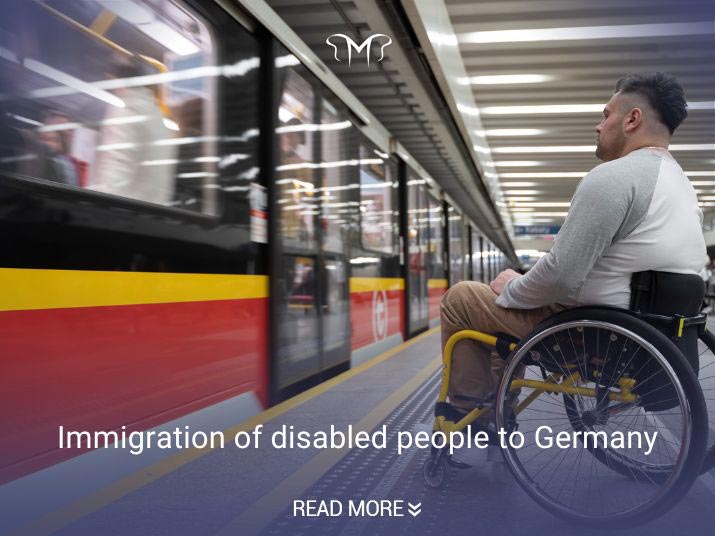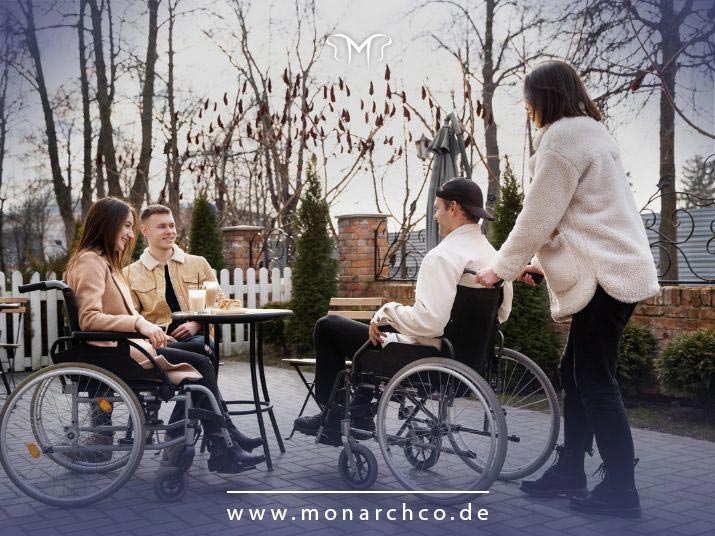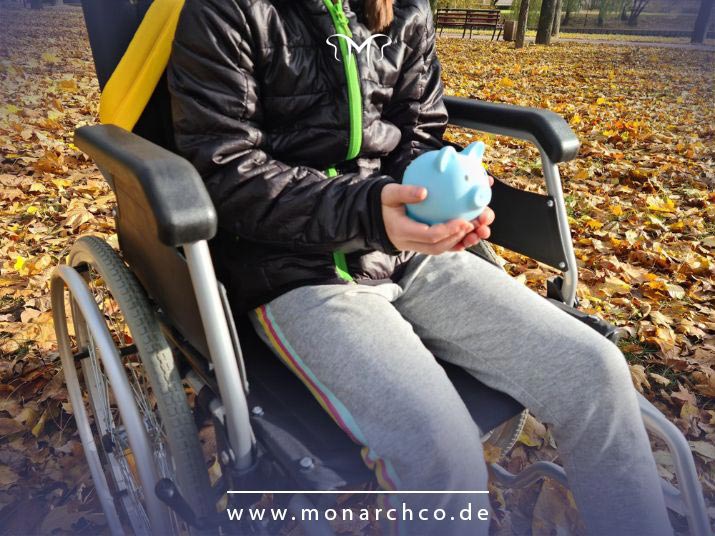
New conditions for the immigration of disabled people to Germany in 2024
Germany provides highly favorable conditions for living for people with disabilities, and in some cases, grants entry and residency visas to individuals with disabilities. In recent years, many developed countries have extended various forms of humanitarian support to people with disabilities, facilitating their immigration and settlement in these countries. This system is designed to make the world a better place for individuals with disabilities. These programs ultimately allow many disabled people to enjoy a trouble-free and desirable life. Due to these policies and support programs, Germany has become one of the best destinations for disabled immigrants, offering extensive facilities to improve their quality of life. Therefore, in this article, we intend to examine the conditions for the immigration of disabled individuals to Germany in 2024. Stay with us.
Why Immigrate to Germany as a Disabled Person?
Germany is one of the few countries in the world that includes special support for disabled immigrants in its national programs. The German government believes that people with disabilities should be supported to compensate for the challenges they face due to their physical limitations. This law, known as the Compensation for Disadvantages (Nachteilsausgleich) Act, highlights Germany as one of the best destinations for disabled immigrants. Some of the services provided by the German government to this group of immigrants include:
- Specialized Medical Care: Providing specialized medical and healthcare services for disabled immigrants.
- Employment Support: Helping disabled individuals find and keep jobs, and protecting them from dismissal.
- Ongoing Home Care Assistance: Providing home care services to assist with daily tasks.
- Child Care Subsidies: Financial support for child care for parents with disabilities.
- Free Public Transportation: Free access to buses and trains.
- Early Retirement: Offering early retirement options for disabled individuals.
- Reduced Taxes: Lowering taxes for disabled individuals.
These services and supports demonstrate the German government's commitment to improving the quality of life for disabled immigrants and compensating for the challenges they face, thereby facilitating their immigration to Germany.
Definition of Disability in Germany
According to German law, a person is considered disabled if they have physical, mental, or psychological limitations that last for more than six months. These limitations must be significant enough to prevent the individual from living a normal life like their peers of the same age.
Physical disabilities, mental disabilities, and chronic illnesses such as rheumatism, multiple sclerosis (MS), cancer, and other similar conditions are considered disabilities and are covered under German disability support regulations. These laws are designed to support and provide appropriate conditions for a better life for disabled individuals.

Support for Disabled Individuals in Germany and Immigration Pathways
Physical disabilities can cause significant mobility issues for individuals. Therefore, information about disability provisions in Germany is crucial. Germany, as a leading country in this field, has measures in place to accept and support disabled individuals.
The criteria for accepting disabled individuals in Germany include:
- Special Talent or Skill: This is seen as an opportunity for a disabled person to be accepted in Germany.
- Language Proficiency: Familiarity with the German language is an important factor for acceptance. (Immigration with the B1 German language level)
- Financial Stability: This criterion ensures that the individual can cover their living expenses.
- Age Over 18: This is one of the acceptance criteria.
- Minimal Treatment Costs to the State Due to Severe Disabilities: This aspect is also considered in the acceptance of a disabled individual.
Germany, as an open-minded country, has implemented necessary measures to accept and support disabled individuals. If they meet the appropriate conditions, these individuals are welcomed.
Disabled Immigrants Supported by the German Government
While Germany offers exceptional services and support to individuals with disabilities, not all disabled persons are entitled to these benefits. The eligibility for receiving support in Germany is determined by personal circumstances and the degree of disability. Additionally, immigrants seeking these supports must apply for a disability card known as the Schwerbehindertenausweis.
In the process of immigrating to Germany, disabled individuals can receive varying levels of care, which include:
Care Level 0
This level is for individuals whose disability significantly hinders their ability to perform daily activities. These individuals need assistance with basic care (such as personal hygiene, eating, or mobility) at home.
Care Level 1
This level is for those who need less care than individuals at Care Level 0. For example, they may need help with at least two activities from one or more areas of basic care at least once a day or require assistance at home several times a week. The average care required must be at least 90 minutes per day, with at least 45 minutes dedicated to primary care.
Care Level 2
This level is for individuals who have a significant dependency on care from others. For instance, they need assistance with primary care at least three times a day at different times or require help at home several times a week. The average required time must be at least three hours per day, with at least two hours devoted to primary care.
Care Level 3
This level is for those needing round-the-clock care or assistance at home multiple times a week. The required time must average at least five hours per day, with at least four hours spent on primary care.
This classification helps determine the services covered by care insurance for disabled immigrants in Germany. Additionally, using these care levels, outpatient care services and non-cash care benefits in the form of care allowances can be obtained for individuals with disabilities.

Support Centers for Disabled Migrants in Germany
Various support centers in Germany provide assistance to individuals with disabilities. For example, the Migration Counseling Center for Adults and the Youth Migration Services Center (JMD) offer counseling to individuals under the age of 27.
In the table below, you can see the names of five organizations and associations that assist individuals with disabilities in Germany:
| Organization Name |
| Deutscher Blinden – und Sehbehindertenverband |
| Bundesverband für Körper und Mehrfachbehinderte |
| Bundesverband Selbsthilfe Körperbehinderter e. V. |
| Deutscher Gehörlosenbund |
| Bundesvereinigung Lebenshilfe für Menschen mit geistiger Behinderung |
These organizations and associations play an important role in supporting and providing services to people with disabilities in Germany, helping them to live independently and with a high quality of life.
Various Methods for Disabled Individuals to Immigrate to Germany
There are several methods through which disabled individuals can obtain residency in Germany. These methods include:
Studying in Germany
Disabled individuals can receive a student visa by gaining admission to German universities and educational institutions, allowing them to study in the country. Many universities offer special facilities and support for disabled students.
Investing in Germany
By investing and starting a business in Germany, disabled individuals can obtain an investment visa and reside in the country. This method involves investing in various sectors of the German economy.
(German residence through investment)
Working in Germany
Disabled individuals can receive a work visa by finding a job and obtaining a job offer from German employers. The German government provides special support to facilitate the employment of disabled individuals in the labor market.
Purchasing Property in Germany
Buying property in Germany is another method of immigrating to the country. Although purchasing property alone does not guarantee residency, it can be a significant factor in the immigration process.
Seeking Asylum in Germany
Under specific circumstances, disabled individuals can apply for asylum in Germany by providing documented and verified reasons regarding their condition. This method requires submitting documents and going through the legal procedures involved.

The Most Affordable Methods for Disabled Individuals to Immigrate to Germany
The most affordable methods for disabled individuals that ultimately lead to obtaining residency are work immigration and study immigration.
Work Immigration
This method is one of the most cost-effective ways to immigrate to Germany. Disabled individuals can receive a work visa by finding a job and obtaining a job offer from German employers. In this method, applicants can not only earn a salary but also benefit from special support and services provided for disabled individuals. Many German companies and organizations offer suitable facilities to facilitate the employment and living conditions of disabled individuals.
Study Immigration
This method is also one of the least expensive ways for disabled individuals to immigrate to Germany. Disabled individuals can receive a student visa by gaining admission to German universities and educational institutions, allowing them to study in the country. Many German universities have special facilities and support for disabled students, helping them study in a suitable and worry-free environment.
Additionally, after completing their studies, students can find a job in Germany, convert their student visa to a work visa, and eventually obtain permanent residency in the country.
Due to the lower costs and extensive support facilities provided for disabled individuals, these two methods are among the most popular and affordable ways for disabled individuals to immigrate to Germany.
Required Documents for Disabled Individuals for Immigration
To obtain a visa, disabled individuals must prepare the following documents and present them to the relevant authorities at the German embassy:
1. Proof of Disability and Evaluation of Individual Conditions:
- This includes medical certifications and reports detailing the type and degree of disability, confirmed by accredited doctors and specialists.
2. Language Certificate:
- Proof of language proficiency required for living and working in Germany, usually through valid language certificates like TestDaF or Goethe-Zertifikat.
3. Proof of Financial Means:
- Applicants must provide documents demonstrating their financial ability to cover living expenses in Germany. This can include bank statements or documents showing financial support from family or sponsoring organizations.
4. Certificate of No Criminal Record:
- This certificate, issued by judicial or law enforcement authorities in the applicant’s current country of residence, must indicate the absence of a criminal record.
5. Valid Passport:
- The passport must be valid for at least the duration of the stay in Germany and have enough pages for visa stamps and entry/exit stamps.
6. Medical Documents Specifying the Type and Degree of Disability:
- These documents include medical reports and specialized evaluations that accurately describe the type and extent of the disability.

Obtaining a Disability Card for Immigration to Germany
The German government supports individuals with disabilities to mitigate the challenges they face due to their conditions. For example, disabled individuals may benefit from:
- Supportive benefits
- Specialized medical care
- Assistance in finding a job or protection against dismissal
- Use of a domestic helper
- Childcare cost support
- Free use of buses and trains
- Early retirement
- Lower taxes
However, not all individuals with disabilities are eligible for these special supports. The personal conditions of each disabled individual determine whether they can access these options and when they can utilize them.
Once the disability of the immigration applicants to Germany is confirmed, the responsible doctors often inform the individuals about how and where to apply for the disability determination. The application for the legal recognition of disability and the degree of disability can be submitted directly to the regional social, youth, and family affairs organization or through a supporting counseling center. The degree of disability is determined by a medical expert for the responsible welfare managers.
The validity period of the disability card depends on the validity of the applicant’s residence permit. In other words, if the residence permit in Germany expires, the disability card is no longer valid. It should be noted that since 2021, such a regulation (a document allowing a temporary stay in Germany) does not apply to individuals with "Duldung." This means that if a disabled immigration applicant has "Duldung," the validity of their disability card is considered independent of the duration of the residence permit in Germany.
Conclusion
Many people around the world aspire to immigrate to Germany. However, immigration can be more challenging for individuals with mental or physical disabilities. Nonetheless, disability is not a barrier to immigration, and many disabled individuals have successfully immigrated to developed countries. In recent years, disabled individuals have been able to immigrate to Germany through study, work, and investment. Germany has created favorable conditions for the lives of disabled individuals. People with disabilities from other countries can obtain entry visas to Germany based on these conditions and, upon entering the country, benefit from the supportive advantages provided by the German government for disabled individuals.


